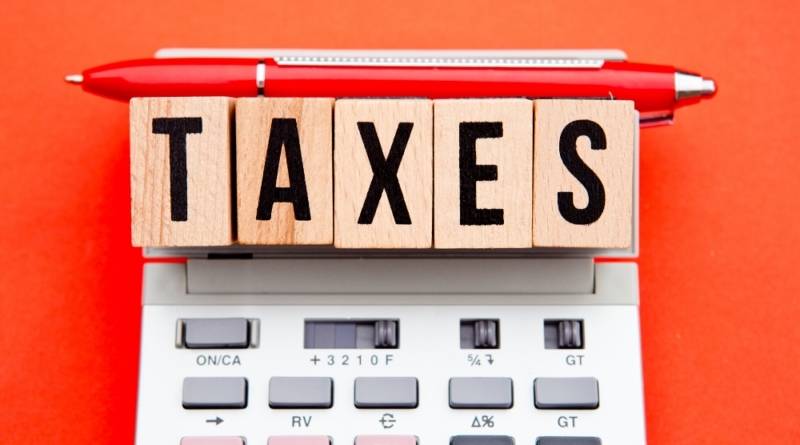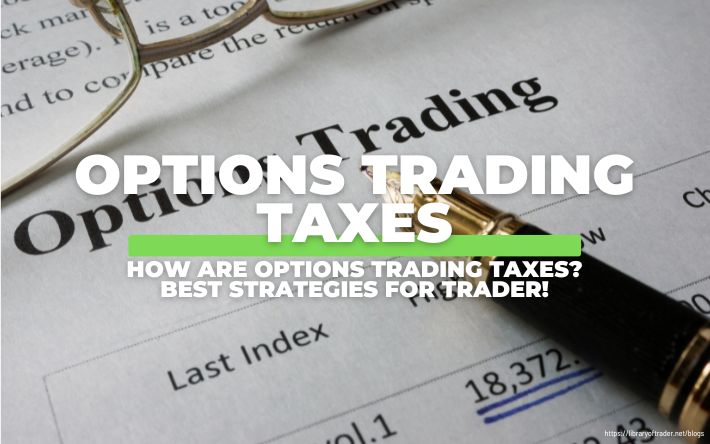Successful investing/trading in options can generate both income and capital gains. Once you’ve made a profitable trade, it’s important to know the rules regarding the options trading taxes treatment of your earnings. Before reading, please note that the author is not a tax expert. This article should only be used as an introduction to options tax treatment. Further due consultation with a tax professional is recommended.
How Are Options Trading Taxes Explained?
Any form is subject to tax, options trading is no exception. Options traders are aware that options trading taxes are important and require specific strategies to reduce costs.
The method of calculating profit and loss will vary depending on the strategy and holding period while many options profits are classified as short-term capital gains. When trading options, closing positions for profit or engaging in covered call writing will both result in different tax calculations.
In investing, the IRS doesn’t mean a perfect match like in finance. The IRS makes a very clear distinction between investors and traders. To be considered a trader, you need to be active and treat it like your day job. Because options trading is gradually gaining popularity with investors.
Some important things you need to know about options trading taxes:
- Options are never taxed as they are initiated. They become taxable events only after they are closed or expire
- Exercised options are tax-free like individual transactions. The premium is paid when the option opens for an adjusted buy or sell on the underlying stock
- LEAPS (Long-Term Equity Anticipation Securities) may qualify for the long-term capital gains tax rate if held for more than a year and then sold at closing
- Expired options show taxable gains or losses for the tax year when they expire
- Short trades can never qualify for long-term capital gains if they expire or are closed for profit, even if it has been more than a year from opening to closing.

What Are the Categories of Options?
Here are the three main options trading categories when categorizing options for tax purposes:
- Employee stock options: is a plan where you have the option to buy shares of a company at a certain price with the aim of increasing the amount of money you bring in from your job.
- Equity options: is a contract that gives the holder the right, but not the obligation, to buy in the event of a call or sell (in the case of a sale) shares of the underlying security at a specified price (strike price) on or before the expiry date.
- Non-equity options: is a derivative contract with the underlying asset being instruments other than stocks.
How Are Options Taxed?
Taxation of employee stock options
These are employee option contracts as a form of compensation. Employee stock options are not exercised on the open market, but they are a type of stock option that is held by many people.
Some highlights of employee stock options:
- Employee options contracts are issued by an employer to attract new employees or to retain existing employees
- There are two types of employee vote options: incentive stock options and non-qualified stock options
Income from the exercise of nonqualified stock options is considered ordinary income. However, profits from incentive stock options may be treated as ordinary income or may be taxed at a preferential rate, if certain requirements are met. To better understand employee stock options, you should first be aware of issues like “How Equity Bonuses Should Fit Your Financial Plan” and “Understanding Risk of Stock Options for Employees.”
Taxation of equity options
Taxing equity options differs between long positions and short positions.
| Long Options
(buy) |
If position is closed before the expiry | If you exercise the option | If the option expires |
| Long Call | The holding period of the options control if it’s taxed at short or long-term capital taxes rates | Exercising a call option raises the cost basis of the stock purchased. Until stock is sold, as well as the hold period of the stock determines if the capital gain or loss is short or long-term, there will be a taxable event u | The holding period of the options control if the capital loss is short or long-term |
| Long Put | Same as above | Exercising a put option lessens the amount realized from the sale of the implicit in stock by the cost of the put | Same as above |
| Short Options
(buy) |
If position is closed before the expiry | If the option is exercised | If the option expires |
| Long Call | Regardless of holding period, the capital gain or loss is always considered short-term | The amount you received for writing the option rises the amount received from the sale of the stock. Determined by your holding period of the stock, the capital gain or loss is short or long-term | Report the amount collected for writing the option as short-term capital gain |
| Long Put | The Same as above | If the put option is exercised and you buy the basic stock, lessen the cost basis in the stock by the amount collected for writing the option. Your holding period for the stock starts on the date you buy it | The Same as above |
Note if you’re doing transactions like a butterfly or spread, the IRS will call them contracts for difference and be taxed differently.
Taxation of Complex Equity Options Strategies
Writing covered calls, straddles, strangles, using spreads, butterflies, etc are strategies available to investors. However, this is another situation where the IRS does not use the same language as the investor and that can lead to some confusion. Instead, the IRS groups most of these complex options strategies together and treats them as a straddle.
For tax purposes when trading options, a spread occurs when you are holding an options contract that offsets or substantially reduces the risk of loss on another position that you also hold.
When you own the stock with a trading price of $80 per share. Let’s say you bought a put option at the actual price of $70 to protect against a downside move. In effect, you are limiting your risk on the downside, which means that the IRS will treat the option as leverage and you must defer your loss (cost) on the put.
How Straddles are taxes:
- If only one side of the tied position is closed, any losses made are not normally deducted until the clearing position is also closed. Any loss is calculated on the basis of the remaining position and is finally recognized when the last position is closed. Note: Any loss in excess of unrecognized profit from a clearing position can generally be deducted.
- Qualified Covered Calls (QCCs) are not subject to the rules of classification: The IRS groups covered calls into two categories, ineligible or qualified, and each is taxed differently. Generally, QCCs are options written with expiration dates greater than 30 days and the actual price is not “too much money” (see IRS Publication 550 to learn more). If a covered call doesn’t meet these requirements, it’s considered “unqualified” and taxed as a crook.
- Section 1256 offset options are exempt from this rule: Full laces including Section 1256 options are not taxed as fasteners (see also below).
The Wash Sale Rules Generally Apply to Options
Wash sale rules apply in options trading to explain that by buying identical security within 30 days (before or after the execution of the sell trade), the loss is not allowed, and the basis is moved into the new position.
Non-equity Options Taxation
Broad-based equity index and options contracts are taxed at a rate of 60/40 keeping the long- and short-term capital ratio (from section 1256 of the Internal Revenue Code). This shows that the taxing of gains and losses from non-own options is not affected by how long you hold them.
In addition to the 60/40 rule, if you hold a section 1256 option at the end of the year and into the new year, you will have to recognize unrealized profit and loss for each year (figures are based on the market value at 31 months) 12). This rule applies even if you don’t sell the option, and it also resets your cost base for the following year.
In addition, section 1256 contracts do not follow the wash sale rule. To understand the details of taxing options contracts with ETFs, consult a tax professional for certainty.

>> Read more: How To Become a Successful Options Trader
Strategies for Options Trading Taxes
Look into Index Options
Long-term investments (held for more than 365 days) will typically be taxed at a lower rate than short-term investments.
Under the 60/40 rule of section 1256, 60% of drinking profits are taxed at the long-term tax rate, and the remaining 40% is at the short-term tax rate. However, in this case, it doesn’t matter how long you’ve held the position. The reason is that 60% of profits will be taxed at a more favorable rate in the long run. Note that options taxing rules are subject to change.
Take the LEAPS
LEAPS stands for Long-Term Equity Anticipation Securities are options contracts that expire up to two years and eight months in the future. Their tax advantage over buying and selling short-term options contracts.
If an investor uses LEAPS to diversify their long-term portfolio and hold them for more than 365 days, the gains will be considered long-term gains and taxed accordingly.
Perhaps Puts (to Offset Gains)
You can buy shares to protect profits in the underlying if you don’t want to pocket the profits because of the short-term tax consequences. If your large position has huge profits and is sold and loses value over time, this trade could work against you.
The remedy is that you should buy in money if the actual price is higher than the stock price. This reduces your risk decay options because some of them have intrinsic value and not all-time value.
You should apply to buy in money to situations where the stock has been held for the long term. Losses will be deferred if the relevant long position increases in price. This strategy only provides temporary protection from a drop in the price of the respective stock. If the long short position expires worthless, the entire investment in the short position will be lost.
Trade in an IRA
IRA trading is the type of trading in a self-directed retirement account. It benefits investors and tax timing. Although the laundered sale rule does not apply in retirement accounts, these transactions can result in laundered sales in a taxable account.
This means that the IRS is starting to look at these two accounts to determine if the wash sell rule contains any violations in the taxable account. These rules will be flexible depending on the brokerage firm and some rules do not allow options in the IRA. So, refer to them and practice them.
Beware the Curse of the 1099-B
Many traders sometimes pay more than they need because they are simply underreporting the cost basis. While there has been a change in IRS rules and brokerage firms must also provide 1099-B cost basis information, you want to make sure the IRS has all of the correct information. This is a tax tip that does not exclude taxes on options trading but is simply a calculation glitch that traders should avoid.
Double-check your expense base data because if you enter the wrong amount, the IRS will tax it and blackmail the revenue. This can result in a possibly higher options trading taxes bill.
The Bottom Line
Options trading taxes are extremely complex. But it is imperative that investors familiarize themselves with the rules governing these derivatives. The content of the article is for information only, not advice for buying and selling decisions. For a comprehensive and accurate understanding of taxes on options trading, refer to explanations from tax experts. Check out more of our useful blogs because it’s free to learn trading.


